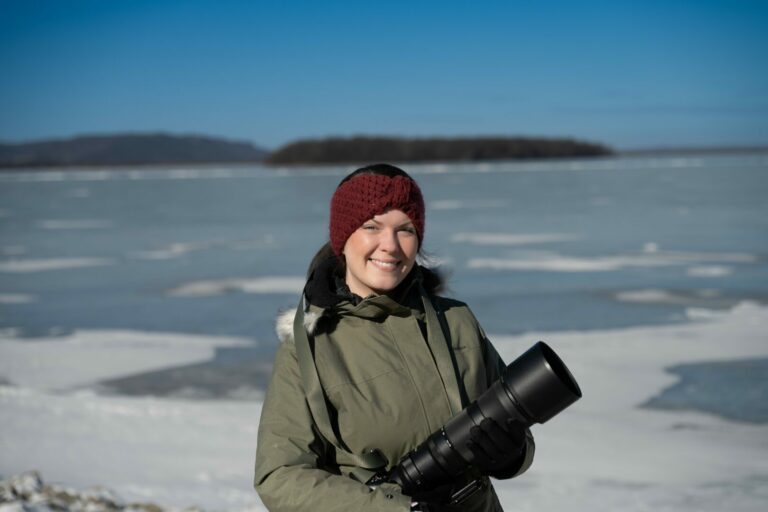Alright – so today we’ve got the honor of introducing you to Anna Scotti. We think you’ll enjoy our conversation, we’ve shared it below.
Anna, we’re thrilled to have you sharing your thoughts and lessons with our community. So, for folks who are at a stage in their life or career where they are trying to be more resilient, can you share where you get your resilience from?
It took me years to develop the resilience necessary to make a career in a creative endeavor. Writers endure a lot of rejection, and frankly, sometimes it’s easier to give up than to keep going! I wrote my young adult novel, Big and Bad, eighteen years before it was published, and for most of that time the manuscript sat gathering dust in a drawer. I was delighted when I finished writing Big and Bad – I knew it was good! So I confidently shipped it off to a publisher – that’s right, one – and I was crushed when it was rejected. That may seem naive, or overly confident, but I really expected the first publisher I sent the book to, to grab it! Disappointed, I threw the manuscript in a drawer and got back to my ‘real’ career – teaching school. I did keep writing a bit, and began to make a little name for myself as a poet, but that rejected book was like a bruise on my heart. One day I was reading one of those ubiquitous articles about successful writers who were turned down dozens of times before they found a publisher, and it got me thinking that maybe I’d given up on Big and Bad too fast. The book is an awkward length, not quite a full-sized novel, but much longer than a short story. It’s a novella, and there’s not a huge market for those. So after updating the manuscript a bit, I did my research and found a publisher who sponsors a novella contest, Texas Review Press. Big and Bad won second prize in their Clay Reynolds competition and they published the book in 2020, right in the middle of the pandemic! Big and Bad got stellar blurbs from Newbery winner Cynthia Kadohata and the renowned poet Ellen Bass, and a rave review from School Library Journal. It even won the Paterson Prize for best young adult novel, grades 6 – 12! But the pandemic stymied a lot of books, including mine. In fact, The New York Times Book Review included Big and Bad in a round-up of books and authors who’d been sorely disappointed by pandemic releases. But in my heart, I’m not disappointed. Big and Bad finally saw the light of day. Seldom does a week go by that I don’t hear from a young reader, and those emails absolutely make my day, week, and year. I have donated all of my earnings from Big and Bad (meager, true, but all mine!) to various dog rescues – dogfighting is at the heart of the story – and I’ll continue to do so. I’ve earned more money as a mystery writer, and I’ve found greater renown as a poet, but Big and Bad is my own personal success story, my reminder to “never give up.”
Thanks for sharing that. So, before we get any further into our conversation, can you tell our readers a bit about yourself and what you’re working on?
I write in a number of genres; my poetry has appeared in The New Yorker since 2016, and has taken a number of awards and prizes, both for individual poems and for my collection, Bewildered by All This Broken Sky, published in 2020 by Lightscatter Press. My young adult novel, Big and Bad, has also been awarded various prizes, and it’s a story that’s very near to my heart, being about a lost dog and a lost teenager who manage to rescue each other against all the odds. But I am probably best known as a mystery writer. I’ve contributed stories to Ellery Queen Mystery Magazine since 2018, and one of those early stories evolved into an ongoing series that is now in its tenth installment. The fourth installment was selected for inclusion in The Best Mystery Stories of the Year (2022, Mysterious Press), alongside the work of Joyce Carol Oates, Colson Whitehead, Michael Connelly, and other literary superstars. So it was a thrill to learn, just days ago, that I will again be included in Best Mystery Stories in the upcoming 2024 edition! My character, Cam Baker, is a librarian forced into witness protection, and the response to her adventures has been really overwhelming. I’m hoping to eventually publish “Cam’s” stories as a collection. I’ve also got a story in the recently released Paranoia Blues (Down & Out Books) that I hope to develop into an ongoing series. Bridge Over Troubled Water, like all the stories in the anthology, was inspired by the work of Paul Simon. The second installment, A Strange Relief, will appear in Sherlock Holmes Mystery Magazine in an upcoming issue. I’m working on a third installment now involving my heroine, Aubrey Blackwell, a teacher in a hard-luck public school in New Mexico. Most writers have day jobs, and I’m no exception. I’ve taught school for twenty-two years, but will soon go on hiatus to devote myself to writing full time. I can only say I’ll miss the kids – to elaborate beyond that would be difficult because I’d be typing on a keyboard wet with tears. I’ll still teach adults online, though – right now I teach two poetry courses for writers.com, and I hope to do a fiction course next year – maybe something about writing mysteries!
Between classes, when I’m not working on a story, I edit the work of others, and I present corporate seminars on writing. Like many editors, I’m a bit of a grammar nerd. (If you stopped and thought about whether that “like” should have been “as,” you might be one, too!) I know, if you hear “mandatory meeting” and “grammar” in the same sentence, you’re probably tempted to take a mental health day, but my seminars are fast-paced, fun, and educational – professional development of the very best kind. I focus on business writing, with an emphasis on common errors and sometimes hilarious pitfalls, followed by a thirty-minute Q & A that always goes on longer than anticipated because once you get them going, people really are interested in using proper and appropriate English! And there’s no pop quiz, ever! What I’ve learned is that people welcome the chance to ask questions of a grammarian knowing they’ll receive a quick, coherent response – not an endless, incomprehensible lecture!
This past year, I’ve also been offering a seminar called “Awakening Creativity,” intended to do just that – shake people out of the office doldrums and get them thinking in new ways. We write a little, share a little, laugh a lot, and write a little more. If you’re interested in writing poetry or prose, or in improving your writing mechanics, get in touch and I’ll explain what I do and how you can join us!
There is so much advice out there about all the different skills and qualities folks need to develop in order to succeed in today’s highly competitive environment and often it can feel overwhelming. So, if we had to break it down to just the three that matter most, which three skills or qualities would you focus on?
I grew up hearing my father quote G.K. Chesterton’s memorable adage, “There are no uninteresting things, only uninterested people.” I’m sure I rolled my adolescent eyes over that one a few times, but I’ve come to understand the deep wisdom represented in Chesterton’s words. Interesting people are intrigued by everything, from bus routes and butterflies to the way a hospital handles radioactive disposal to the special jargon a waiter uses to communicate with the kitchen. A mystery writer learns to be extremely observant, because it’s the details that make prose believable and real. One of my most successful stories, Schrodinger, Cat, (nominated for the International Thriller Award and the prestigious Macavity Award, and the recipient of an award from Ellery Queen Mystery Magazine) involves a physicist working on time travel. I had to learn a bit – not a lot, but a bit – about quarks and asterisms and string theory and Bostrum’s simulation theory. I didn’t have to be able to pass myself off as an astrophysicist, but I did have to convincingly assume the persona of an office worker who lives with an astrophysicist, and has a layperson’s understanding of the topics he studies. And that takes not only observation and concentration, but also the ability to engage in an area of learning that might not ordinarily be within my purview. The same is true of a mystery writer inventing characters who are small children, or very elderly, or mentally ill, or of a different gender or nationality or occupation or social class than one’s own – imagination alone is not enough. Only by patient observation can one even hope to get it close to right. So when young people tell me they want to be writers, I tell them that study and practice and reading are great, and necessary – but concomitant to that they must develop the intellectual curiosity that enables one to be interested in every aspect of the gorgeous world around us.
Tell us what your ideal client would be like?
I work with a number of poets and fiction writers who are very serious about their work, but for various reasons choose not to join a class or writers workshop. Some are shy – others are extremely busy with unrelated careers and family obligations, and prefer to work remotely, by email or in shared documents. I don’t ask that my clients commit to a particular number of writing hours a week – I work when they are ready to work, and it sorts itself out. Recently, two of my clients have published professionally, and I’m over the moon for them and proud that I contributed in a small way to their success. I welcome new clients! If a writer is interested in working with me, they can contact me via my website for details of how it works.
Contact Info:
- Website: www.annakscotti.com
- Instagram: @annakscotti
- Facebook: Anna Scotti, author







Image Credits
Victoria Scotti (all)




